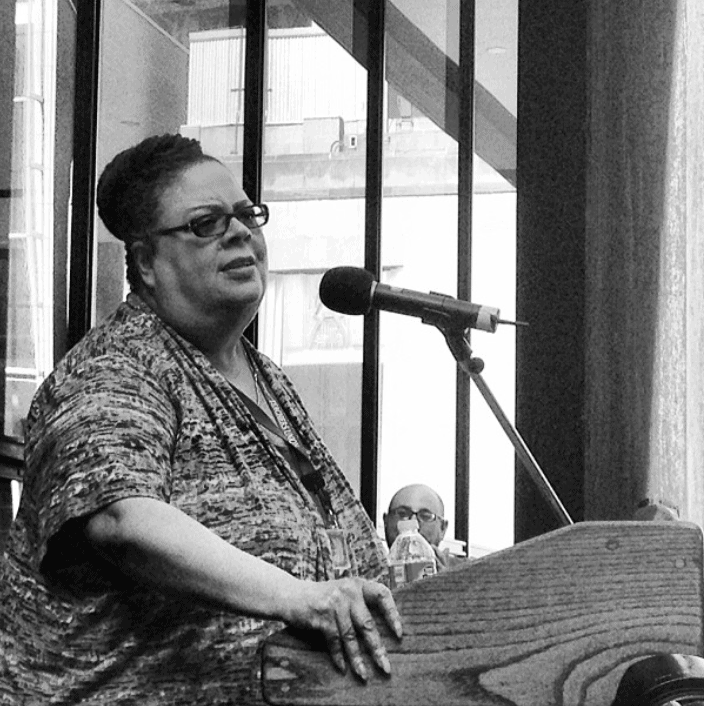
Jon Levitan is a student at Harvard Law School and a member of the Labor and Employment Lab.
Karen Lewis, the visionary former leader of the Chicago Teachers Union (CTU), died yesterday at 67. She had been battling cancer since 2014. A high school chemistry teacher for 20 years, Lewis rose to power in the CTU by co-founding the CORE caucus which challenged staid union leadership that had failed to adequately combat privatization and refused to tie the CTU’s struggle to broader social movements. Under Lewis’s leadership, the CTU embarked on a historic 2012 strike where they pushed for not only improved bread and butter working conditions but also education policy initiatives like more nurses and social workers in schools and smaller class sizes. Lewis is credited with revitalizing not only the CTU but teachers unions nationwide, as her relentless crusade against privatization and for more just public schools inspired the Red for Ed strike wave in 2018 and 2019.
Tributes to Lewis poured in from around the labor movement. Jesse Sharkey, currently the Vice President of the CTU, called Lewis a “fearless truth teller” whose “ability to speak to the mass media and working-class people in the city really caught hold of the imagination of people broadly in Chicago.” Sharkey pointed to Lewis calling former Chicago mayor Rahm Emanuel the “murder mayor” as evidence of hew willingless to speak truth to power. Randi Weingarten, President of the American Federation of Teachers, with which the CTU is affiliated, said Lewis was “was the epitome of humanity.. fierce & funny; brilliant & bad ass.” Steven Greenhouse tweeted that “if any union official was responsible for the surge in militancy among teacher unions…it was Lewis.” The CTU put it simply: “Karen helped us recognize our own power.”
Voting is underway in the union election at a Bessemer, Alabama Amazon warehouse. A win for the Retail, Wholesale, and Department Store Union (RWDSU) would be one of the labor movement’s greatest triumphs in years: a successful organizing drive conducted against an immensely powerful employer in the deep south during a deadly pandemic. The pandemic, in fact, may give an edge to the RWDSU and organizers. The pandemic forced the NLRB election to be conducted via mail (Amazon pushed for an in person election but their request was denied) over the course of seven weeks; workers have until the end of March to return their ballots. But an NLRB rule announced in Peerless Plywood requires the employer to cease captive audience meetings – where it requires workers to listen to anti-union propaganda during their shifts – 24 hours before voting begins. So Amazon is refrained from delivering captive audience speeches for nearly two months, which could lessen the impact of their anti-union campaign for later voters.
That the most serious threat to unionize an Amazon warehouse has come in Alabama has been a surprise to some observers (including this author), but Alex Press, writing for The New Republic, argues we shouldn’t be surprised by Bessemer being home to potentially the first Amazon union in the country. The Birmingham-Bessemer metropolitan area was once a hotbed of steel mills and coal mining, and was a stronghold of the United Mine Workers. And Press writes that, while there is a history of white supremecist unions in Alabama, the modern Alabaman labor movement has explicitly tied its fight to the struggle for racial justice. Press cites a quote RWDSU President Stuart Appelbaum gave to Bloomberg: “We see it as much of a civil-rights battle as a labor battle. The overwhelming majority, perhaps, greater than 85% of the workers at this facility are African American. And their major concern seems to be that they’re not treated with respect.”






Daily News & Commentary
Start your day with our roundup of the latest labor developments. See all
July 14
More circuits weigh in on two-step certification; Uber challengers Seattle deactivation ordinance.
July 13
APWU and USPS ratify a new contract, ICE barred from racial profiling in Los Angeles, and the fight continues over the dismantling of NIOSH
July 11
Regional director orders election without Board quorum; 9th Circuit pauses injunction on Executive Order; Driverless car legislation in Massachusetts
July 10
Wisconsin Supreme Court holds UW Health nurses are not covered by Wisconsin’s Labor Peace Act; a district judge denies the request to stay an injunction pending appeal; the NFLPA appeals an arbitration decision.
July 9
the Supreme Court allows Trump to proceed with mass firings; Secretary of Agriculture suggests Medicaid recipients replace deported migrant farmworkers; DHS ends TPS for Nicaragua and Honduras
July 8
In today’s news and commentary, Apple wins at the Fifth Circuit against the NLRB, Florida enacts a noncompete-friendly law, and complications with the No Tax on Tips in the Big Beautiful Bill. Apple won an appeal overturning a National Labor Relations Board (NLRB) decision that the company violated labor law by coercively questioning an employee […]